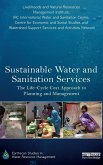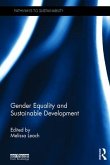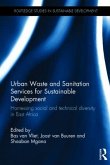Equality in Water and Sanitation Services
Herausgeber: Cumming, Oliver; Slaymaker, Tom
Equality in Water and Sanitation Services
Herausgeber: Cumming, Oliver; Slaymaker, Tom
- Gebundenes Buch
- Merkliste
- Auf die Merkliste
- Bewerten Bewerten
- Teilen
- Produkt teilen
- Produkterinnerung
- Produkterinnerung
This book provides an authoritative textbook for students, as well as point of reference for policy-makers and practitioners interested in reducing inequalities in access to WASH services.
Andere Kunden interessierten sich auch für
![Equality in Water and Sanitation Services Equality in Water and Sanitation Services]() Equality in Water and Sanitation Services59,99 €
Equality in Water and Sanitation Services59,99 €![Sustainable Water and Sanitation Services Sustainable Water and Sanitation Services]() Livelihoods & Natural Resource ManagmentSustainable Water and Sanitation Services197,99 €
Livelihoods & Natural Resource ManagmentSustainable Water and Sanitation Services197,99 €![The Political Economy of Water and Sanitation The Political Economy of Water and Sanitation]() Matthias KrauseThe Political Economy of Water and Sanitation63,99 €
Matthias KrauseThe Political Economy of Water and Sanitation63,99 €![The Political Economy of Water and Sanitation The Political Economy of Water and Sanitation]() Matthias KrauseThe Political Economy of Water and Sanitation185,99 €
Matthias KrauseThe Political Economy of Water and Sanitation185,99 €![Water for Food Security, Nutrition and Social Justice Water for Food Security, Nutrition and Social Justice]() Lyla MehtaWater for Food Security, Nutrition and Social Justice168,99 €
Lyla MehtaWater for Food Security, Nutrition and Social Justice168,99 €![Gender Equality and Sustainable Development Gender Equality and Sustainable Development]() Gender Equality and Sustainable Development168,99 €
Gender Equality and Sustainable Development168,99 €![Urban Waste and Sanitation Services for Sustainable Development Urban Waste and Sanitation Services for Sustainable Development]() Urban Waste and Sanitation Services for Sustainable Development177,99 €
Urban Waste and Sanitation Services for Sustainable Development177,99 €-
-
-
This book provides an authoritative textbook for students, as well as point of reference for policy-makers and practitioners interested in reducing inequalities in access to WASH services.
Produktdetails
- Produktdetails
- Verlag: Routledge
- Seitenzahl: 338
- Erscheinungstermin: 24. Juli 2018
- Englisch
- Abmessung: 240mm x 161mm x 23mm
- Gewicht: 672g
- ISBN-13: 9781138203495
- ISBN-10: 1138203491
- Artikelnr.: 57044122
- Herstellerkennzeichnung
- Libri GmbH
- Europaallee 1
- 36244 Bad Hersfeld
- gpsr@libri.de
- Verlag: Routledge
- Seitenzahl: 338
- Erscheinungstermin: 24. Juli 2018
- Englisch
- Abmessung: 240mm x 161mm x 23mm
- Gewicht: 672g
- ISBN-13: 9781138203495
- ISBN-10: 1138203491
- Artikelnr.: 57044122
- Herstellerkennzeichnung
- Libri GmbH
- Europaallee 1
- 36244 Bad Hersfeld
- gpsr@libri.de
Oliver Cumming is an Assistant Professor of Environmental Health at the London School of Hygiene and Tropical Medicine, UK, where he works on the epidemiology of water and sanitation-related diseases. He is currently working on multiple trials to assess the impact of water and sanitation interventions on childhood enteric infection, undernutrition and oral vaccine failure in Africa and South Asia. Tom Slaymaker is a Senior Statistics and Monitoring Specialist in the Data and Analytics section at UNICEF Headquarters, USA. He has nearly 20 years of experience working on water and sanitation in Africa and Asia, and currently co-leads the WHO/UNICEF Joint Monitoring Programme for Water Supply, Sanitation and Hygiene (JMP).
1. Progress in tracking inequalities - lessons from MDG monitoring 2. The
human rights to water and sanitation: challenges and implications for
future priorities 3. The potential of the SDG framework to promote equality
through WASH initiatives 4. Equality in water supply provision - Beyond
numbers served 5. WASH and Gender: understanding gendered consequences and
impacts of WASH in/security 6. The Environmental Dimensions of Universal
Access to Safe Water 7. How international water and sanitation monitoring
fails deprived urban dwellers 8. First a basic service for all - reducing
WASH inequalities through more equitable funding and financing strategies.
9. Breaking the barriers - disability, ageing and HIV in inclusive WASH
programming 10. Addressing the Menstrual Needs of Women and Girls is
Necessary to Achieve Gender Equality in Water and Sanitation Service
Delivery 11. The interlocking inequalities of poor water and sanitation,
poor nutrition and lack of access to healthcare 12. Monitoring inequalities
in WASH service levels 13. Benchmarking progress on reducing inequalities
over time 14. Counting the costs and benefits of equitable WASH service
provision 15. Inequality beyond the toilet: fecal sludge management and the
community-level dimensions of sanitation
human rights to water and sanitation: challenges and implications for
future priorities 3. The potential of the SDG framework to promote equality
through WASH initiatives 4. Equality in water supply provision - Beyond
numbers served 5. WASH and Gender: understanding gendered consequences and
impacts of WASH in/security 6. The Environmental Dimensions of Universal
Access to Safe Water 7. How international water and sanitation monitoring
fails deprived urban dwellers 8. First a basic service for all - reducing
WASH inequalities through more equitable funding and financing strategies.
9. Breaking the barriers - disability, ageing and HIV in inclusive WASH
programming 10. Addressing the Menstrual Needs of Women and Girls is
Necessary to Achieve Gender Equality in Water and Sanitation Service
Delivery 11. The interlocking inequalities of poor water and sanitation,
poor nutrition and lack of access to healthcare 12. Monitoring inequalities
in WASH service levels 13. Benchmarking progress on reducing inequalities
over time 14. Counting the costs and benefits of equitable WASH service
provision 15. Inequality beyond the toilet: fecal sludge management and the
community-level dimensions of sanitation
1. Progress in tracking inequalities - lessons from MDG monitoring 2. The
human rights to water and sanitation: challenges and implications for
future priorities 3. The potential of the SDG framework to promote equality
through WASH initiatives 4. Equality in water supply provision - Beyond
numbers served 5. WASH and Gender: understanding gendered consequences and
impacts of WASH in/security 6. The Environmental Dimensions of Universal
Access to Safe Water 7. How international water and sanitation monitoring
fails deprived urban dwellers 8. First a basic service for all - reducing
WASH inequalities through more equitable funding and financing strategies.
9. Breaking the barriers - disability, ageing and HIV in inclusive WASH
programming 10. Addressing the Menstrual Needs of Women and Girls is
Necessary to Achieve Gender Equality in Water and Sanitation Service
Delivery 11. The interlocking inequalities of poor water and sanitation,
poor nutrition and lack of access to healthcare 12. Monitoring inequalities
in WASH service levels 13. Benchmarking progress on reducing inequalities
over time 14. Counting the costs and benefits of equitable WASH service
provision 15. Inequality beyond the toilet: fecal sludge management and the
community-level dimensions of sanitation
human rights to water and sanitation: challenges and implications for
future priorities 3. The potential of the SDG framework to promote equality
through WASH initiatives 4. Equality in water supply provision - Beyond
numbers served 5. WASH and Gender: understanding gendered consequences and
impacts of WASH in/security 6. The Environmental Dimensions of Universal
Access to Safe Water 7. How international water and sanitation monitoring
fails deprived urban dwellers 8. First a basic service for all - reducing
WASH inequalities through more equitable funding and financing strategies.
9. Breaking the barriers - disability, ageing and HIV in inclusive WASH
programming 10. Addressing the Menstrual Needs of Women and Girls is
Necessary to Achieve Gender Equality in Water and Sanitation Service
Delivery 11. The interlocking inequalities of poor water and sanitation,
poor nutrition and lack of access to healthcare 12. Monitoring inequalities
in WASH service levels 13. Benchmarking progress on reducing inequalities
over time 14. Counting the costs and benefits of equitable WASH service
provision 15. Inequality beyond the toilet: fecal sludge management and the
community-level dimensions of sanitation








